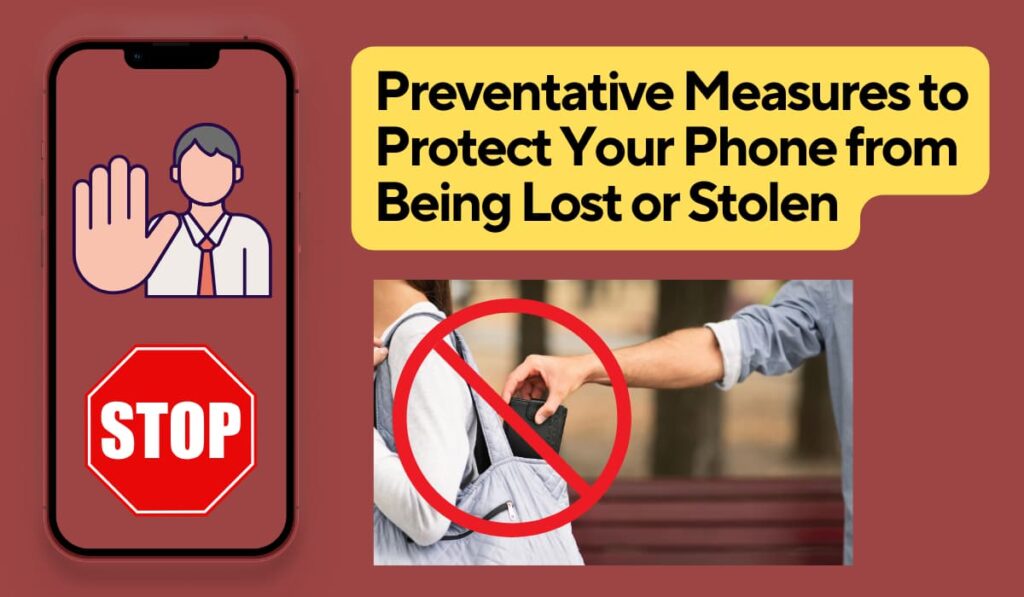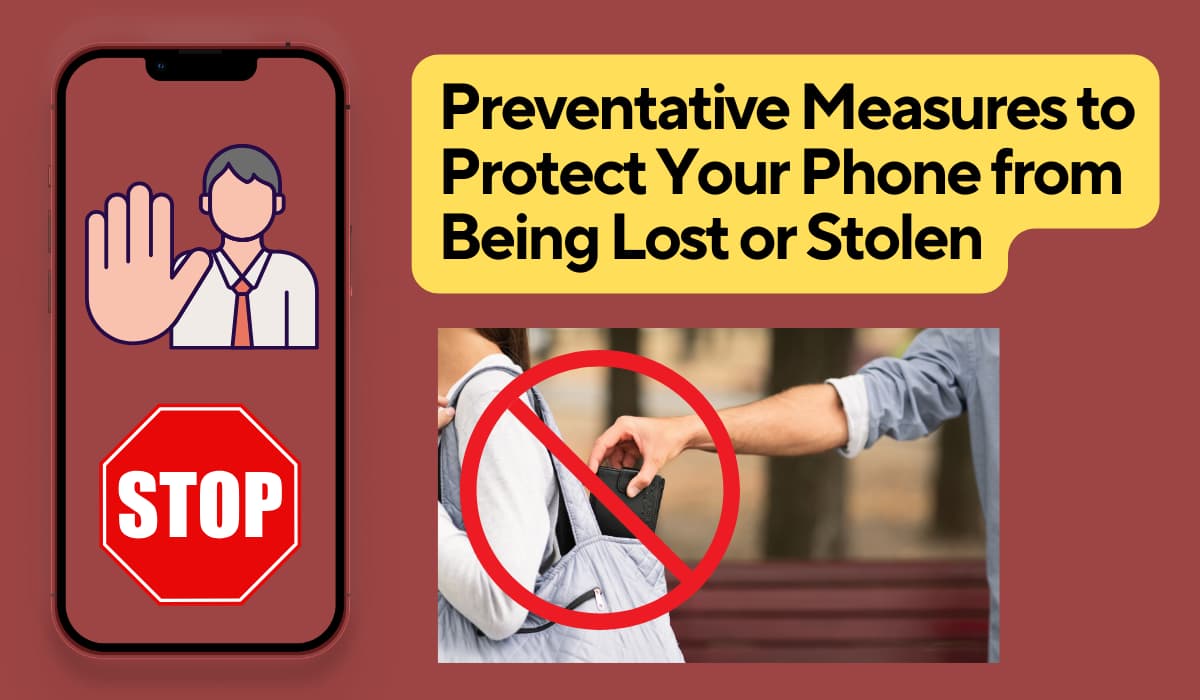You use your mobile phone for many things other than just calling people. Your phone helps you do daily tasks like checking messages, taking pictures, making payments, and finding directions.
If you lose your phone, it can create big problems in your daily life and work. Nowadays, many people lose their phones or have them stolen. Every year, millions of phones are lost or stolen from people.
This is a big issue because if someone else gets your phone, they can see your personal information like photos and messages. They can also misuse your phone for doing illegal things like theft or fraud.

That is why you need to take steps to protect your phone from getting lost or stolen. If you take some precautions, you can reduce the chances of losing your phone. And even if you do lose it, the damages will be less.
In this blog, you will learn different ways to keep your phone safe and secure with you at all times.
Common scenarios where phones are often lost or stolen
Many times, people lose their phones or have them stolen in public places. This can happen in situations where you keep your phone somewhere and forget about it. Or when thieves can easily take your phone.
Some common places where phone loss or theft happens:
- Public transport like buses, trains etc. It’s easy to forget your phone on a seat or have it stolen from your bag in crowded areas.
- Restaurants and cafes. People often leave phones on tables, and someone can quickly take it when you’re not looking.
- Parks and gyms. People keep their phones in bags or on benches while exercising, making them easy targets for thieves.
- Airports and hotels. With so many people around, phones can get stolen from bags, charging points or even hotel rooms.
- Offices and schools. Even these places are not fully safe, as phones left unattended on desks or in lockers can be taken.
If someone else gets your lost or stolen phone, it can create very big problems beyond just losing an expensive device:
- Your personal information like photos, messages, contacts etc. can be misused for privacy violations or identity theft.
- If your banking apps or card details are on the phone, there can be financial losses due to fraud.
- For office phones, company data can get leaked causing business troubles.
- You may also lose precious memories stored in the phone’s gallery
Preventive Strategies
You can take some important steps to prevent your phone from getting lost or stolen:
- Use Security Apps
Most phones come with security features to help you. iPhone users can use ‘Find My iPhone’ and Android users can use ‘Google’s Find My Device’. With these, you can see your phone’s location, lock it remotely, or even delete data if it is lost/stolen. You should enable these features in your phone’s security settings. You can also use our Tool to Trace Mobile Number.
- Physical Safety Measures
Always keep your phone safe and in front of you in public areas. When travelling or at cafes, keep it in your front pockets or zipped bags. At work, lock it in drawers or lockers if left unattended. Don’t leave it openly visible.
- Protect Your Data
Always use strong passwords and biometric locks like fingerprints to prevent unauthorized access. You should avoid simple passwords that can be guessed. Take regular backups of your phone data to the cloud or hard disks to recover it later if needed. You can also use encryption to further secure your phone’s contents.
- Be Alert
Minimize using your phone in crowded public areas where you can get distracted and targeted by thieves. If needed, use your phone discreetly by standing against a wall away from crowds. Stay aware of your surroundings.
- Use Protection Accessories
Get secure phone cases with straps so they can’t be easily snatched. Use screen protectors that only allow viewing from directly in front, preventing peeping. These accessories increase physical and data security.
Along with the tips mentioned earlier, you can take some more steps to better secure your phone and reduce loss/theft risks:
- Get Geofencing Alerts
Use apps that can create virtual boundaries around safe zones like your home, office etc. These apps will alert you if your phone moves out of these areas without your knowledge. - Hide Phone During Travel
When travelling to new crowded places, keep your phone hidden securely on your body instead of open bags/pockets. You can use money belts, undercover pouches or jackets with inside zipped pockets. - Use Anti-Theft Bags
Get bags designed to prevent theft – with hidden zippers, anti-cut straps and materials that block phone signals. This gives extra security when carrying your phone outside. - Allow Remote Camera Access
Some security apps let you remotely click photos from your phone’s camera if it’s lost/stolen. This can help see the surroundings or identify the thief. - Get Phone Insurance
Insuring your phone is a good idea, especially if it’s expensive. Insurance covers repair/replacement costs in case of loss/theft and it reduces financial damage. - Join Community Watch Apps
Such apps allow people to report stolen items or suspicious activities. This network increases the chances of locating and recovering lost/stolen phones. - Update Software Regularly
Keep updating your phone’s operating system and apps, as updates fix security holes that thieves could exploit on old software versions.
What to Do If Your Phone Is Lost or Stolen
If you lose your phone or it gets stolen, you need to act fast to protect your personal information and increase your chances of getting it back. Follow these steps immediately:
Urgent Steps:
- Lock and Locate the Phone
Use “Find My Device” (Android) or “Find My iPhone” (iOS) to remotely lock your phone and display a contact message on the lock screen. These can also help track your phone’s location if it’s still on. - Change Passwords
Quickly change passwords for email, social media, banking apps etc. that were accessible from your phone to prevent misuse. - Inform Service Provider
Call your telecom operator and inform them about phone loss/theft. They can disable your account and number to stop any unauthorized usage. They can also blacklist your phone’s IMEI to prevent its use on any network. - File Police Complaint
Report the incident to the police with details like the phone’s make, model, colour, IMEI number etc. This report is needed for insurance claims and can assist recovery efforts. - Contact Insurer
If you have phone insurance, reach out to them with the police complaint number to start the claim process for replacement/reimbursement. - Remote Data Wipe
As a final option, if the phone seems unrecoverable and has very sensitive data, use a remote wipe to erase all content. But this prevents further tracking.
New Security Technologies
Nowadays, there are many new preventive features available:
- Advanced GPS tracking apps for precise real-time and historical location monitoring to aid recovery.
- AI security apps that detect suspicious access attempts and lock phones automatically.
- Biometric locks like a fingerprint, face, and iris recognition for high security.
- Encryption makes data inaccessible without proper access, even if the phone is stolen.
Conclusion
In the end, taking steps to protect your phone is extremely important. Our phones contain lots of personal information like contacts, messages, banking details and even precious memories. If a phone is lost or stolen, it can disrupt our daily routine and also lead to bigger issues like privacy violations or financial losses.
A little bit of preparation and care can save you from major troubles later on. By using strong passwords, enabling phone tracking, taking regular backups etc., you can keep your device and data fully secure. The small efforts you make now will prevent bigger stress and damages from security breaches or theft incidents in the future.
So take some time to review the security settings and practices for your phone right now. When was the last time you updated passwords or took a backup? See if there are any areas where you can increase protection.


